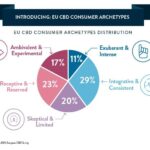Introducing Five Demographic Archetypes Among EU CBD Consumers

First Look at the Nine CBD Consumer Archetypes in Europe
March 3, 2020
Introducing: EU CBD Consumer Archetypes
March 8, 2020By Molly McCann, Research Director, New Frontier Data
As CBD has undergone booming growth in popularity, consumers in the European Union (EU) increasingly are being exposed to information and products — and trying to understand the cannabinoid’s potential for how it might best benefit them.
In the second report of the EU CBD Consumer Series — and following New Frontier Data’s groundbreaking archetyping of U.S. cannabis consumers in the 2018-2019 Cannabis Consumer Trends Report: Archetypes, Preferences & Trends —five newly identified archetypes among European CBD consumers are analyzed to help brands and marketers better understand who CBD consumers are, what they believe, and how they behave. From the most to least frequently consuming demographic groups, the archetypes include:
The Exuberant & Intense are the smallest but most extreme group (11%) of consumers. They are voracious in their use of CBD products, using them the most frequently of any identified archetypes, in the widest variety of product forms, and expressing the broadest interest in trying new products. They are the highest spenders among CBD consumers, and have overwhelmingly positive feelings about CBD. Exuberant & Intense consumers are also the most recent adopters, as more than a third (35%) reported that they first consumed CBD less than a month earlier, indicating that their aggressive consumption practices may represent an initiation stage. Given that, their use will likely stabilize as it is more carefully calibrated to reflect specific applications and targeted outcomes.
The Integrative & Consistent represent the largest group (29%) of consumers (29%) and are the second-most frequent consumers (averaging at least weekly usage). As the second-highest spending group, the Integrative & Consistent may be considered the most stable archetype among consumers, as they consume CBD for a wide variety of reasons, having deeply integrated it into their lives and understandings of health and wellness. They have an exclusively positive impression of CBD, and are staunch believers in its medical efficacy.
The Skeptical & Limited account for one-fifth (20%) of consumers. They use CBD in moderate frequency, yet are broadly uninterested in trying new forms or products, and do not seem to have actively incorporated CBD into an overall lifestyle practice. Their impression of CBD is still mostly positive, but they are generally wary of health claims and purported benefits, and least likely to support CBD’s being freely available to the general public. It appears likely that some Skeptical & Limited consumers may eventually feel that their concerns have been adequately addressed, at which point they may transition to joining the Integrative & Consistents, or more likely, the Receptive & Reserveds.
The Receptive & Reserved consumers are also moderately frequent habitués who make up nearly a quarter (23%) of Europeans using CBD. They are the least likely group to have other CBD consumers in their social circles, but have very positive feelings about CBD, believe strongly in its medical efficacy, and support its broad availability. Without recommendations coming from family and friends, they have not incorporated CBD thoroughly into their lifestyle. Rather, they engage with a relatively narrow range of CBD forms while showing an interest in trying new forms and learning more about CBD. Many Receptive & Reserved consumers are likely to remain moderate and fairly isolated in their use. Nevertheless, as the CBD markets in which they live mature, some will have access to a wider variety of products, potentially satisfying their interest in trying new product forms and drawing them into more regular use.
The Ambivalent & Experimental group (17%) of consumers are the only consumer archetype to have consumed but not purchased CBD, instead sourcing it informally, typically from friends and family. They are also the least-frequent consumers (many having tried CBD only once or twice), have the fewest defined reasons for using CBD, and tend to have relatively conservative beliefs about CBD overall. Ambivalent & Experimental consumers are among the least likely to convert into routine CBD consumers. However, there is a subgroup within the archetype that might be brought back into the fold: About a third (35%) of this archetype first consumed CBD more than a year before completing the survey, and in the interim CBD product offerings have diversified significantly. There could be some who (though unsatisfied with their experimentation with CBD in the very early days of the market) may be sufficiently compelled by new product forms or other recent developments to give CBD another try.
The European CBD survey is part of New Frontier Data’s ongoing series of CBD-focused research projects examining marketplaces in the United States and in Europe to provide in-depth insights on the growing CBD industry. To learn more about CBD archetypes, download our newest report, The EU CBD Consumer Report Series: Segmentation & Archetypes.




